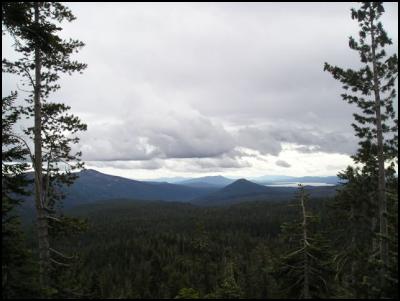Martin LeFevre: Hollywood’s Perpetual Halloween
Hollywood’s Perpetual Halloween
In one of Hollywood’s latest in the perennial series of TV cop shows (e.g. Hill Street Blues, CSI, Criminal Intent, and now “Criminal Minds”) there is a very telling and theological opening line.
“No matter how far or fast light travels, darkness got there first, and is waiting for it.”
What Hollywood genius wrote that, I wonder? No matter, he or she, in attempting to do propaganda for darkness, has provided material for intelligence to burn. No pun on hell intended.
The not so subliminal message is this: ‘No matter what you do, no matter how deep or far you go, no matter how much light you bring into the darkness within, the stygian darkness will be there waiting for you.’
The subtext of course is that it’s no use doing the tough spadework of bringing light into the darkness within one, because collective darkness is bottomless, and it will always be there waiting to mess with you some more
But is it really so? No, human consciousness is darkness, to one degree or another. As such, content-consciousness is not only the increasingly untenable ground of our existence on this planet, but we are tested and forged by our encounters with darkness, within and collectively.
Besides, life is actually the transcendent moments--like when you see the spreading fire of a sunset splashed across half the sky; or when you catch the look on your child’s face as if you’d been gone a year when you return home from work. Such moments belie the odious idea that “darkness got there first.” Life is such moments, no matter how deep and wide the crud is.
Then what is this thing, evil, and where did it come from? Is it human, or is it as Christianity and most other religions fearfully maintain, a priori, and from the supernatural realm?
There is no supernatural realm, only levels of ourselves we don’t know, and dimensions of life we’ve never touched.
In addition, evil is man-made, not cosmically made, waiting for us to be born as a species and as individuals. ‘Original sin’ is a crock; there’s only the ongoing mistake of separation as ‘me’ and ‘mine.’
Why then does this spiritual death wish within us exist? When the Interahamwe macheted children in front of their parents during the Rwandan genocide, and then macheted the parents, what was evil really trying to kill? Not the bodies of the children and parents obviously, but the souls of all those who learn of such evil and run away in fear from the darkness within themselves
It’s not enough to say that darkness can be dissolved daily within oneself, sufficiently to keep one essentially clean. Nor is it enough to see that collective darkness emanates from the inwardly dead (living and deceased) wanting everyone alive to be like them, so as to justify their weakness.
Then what keeps one going? Emotionally perceiving what life actually is, and the reason we’re here.
Humans grow into human beings, and human beings into gods, by the growth of awareness within the individual. Awareness is love, and we are on earth to grow in awareness within ourselves.
That is difficult enough, but much more so in the face of the darkness and deadness that saturates the North American culture hearth. Even so, the tough part, the thing we don’t want to go anywhere near, is the question of death.
The great paradox of life is that only in dying psychologically does physical death cease to mean much. Besides, most of us are afraid of physical suffering, but not death itself. What we fear is psychological death, the ending of ‘me.’ But that’s precisely what we must seek if we are to grow as human beings.
With each moment of dying to the self and time and the past, awareness grows within one. And in dying as humans (creatures of tradition, experience, and the past), we metamorphose into human beings. In turn, dying as human beings, we metamorphose into gods.
The gods were once human, just as demons were. But gods don’t’ fight demons. The demons oppose the gods, who are inviolable to them. As human beings, we can only grow if we stand and face within, not if we fight or flee from darkness.
What continues after death? Without learning the art of dying every day, what continues is one’s unfinished business, which joins the massive murky river of man’s past.
On the other hand, when we die daily and grow
in life, awareness and love continue without continuity
after death.
- Martin LeFevre is a contemplative, and non-academic religious and political philosopher. He has been publishing in North America, Latin America, Africa, and Europe (and now New Zealand) for 20 years. Email: martinlefevre@sbcglobal.net. The author welcomes comments.



 Binoy Kampmark: Jesting On The Environment - Australian Mining Gets A Present
Binoy Kampmark: Jesting On The Environment - Australian Mining Gets A Present Martin LeFevre - Meditations: The Antithesis Of What Jesus Taught And Lived
Martin LeFevre - Meditations: The Antithesis Of What Jesus Taught And Lived  Ramzy Baroud: The West Bank's Men Of The CIA - Why Is The PA Killing Palestinians In Jenin?
Ramzy Baroud: The West Bank's Men Of The CIA - Why Is The PA Killing Palestinians In Jenin? Binoy Kampmark: Concentrated Markets And Iceless Fokkers
Binoy Kampmark: Concentrated Markets And Iceless Fokkers Binoy Kampmark: Catching Pegasus - Mercenary Spyware And The Liability Of The NSO Group
Binoy Kampmark: Catching Pegasus - Mercenary Spyware And The Liability Of The NSO Group Ramzy Baroud: The World Owes Palestine This Much - Please Stop Censoring Palestinian Voices
Ramzy Baroud: The World Owes Palestine This Much - Please Stop Censoring Palestinian Voices